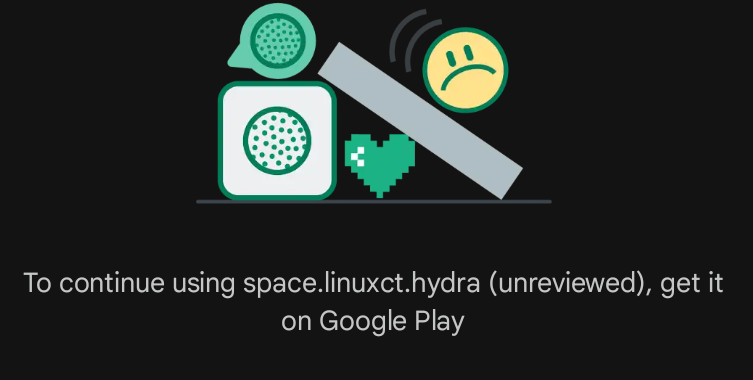You might sideload an Android app, or manually install its APK package, if you’re using a custom version of Android that doesn’t include Google’s Play Store. Alternately, the app might be experimental, under development, or perhaps no longer maintained and offered by its developer. Until now, the existence of sideload-ready APKs on the web was something that seemed to be tolerated, if warned against, by Google.
This quiet standstill is being shaken up by a new feature in Google’s Play Integrity API. As reported by Android Authority, developer tools to push “remediation” dialogs during sideloading debuted at Google’s I/O conference in May, have begun showing up on users’ phones. Sideloaders of apps from the British shop Tesco, fandom app BeyBlade X, and ChatGPT have reported “Get this app from Play” prompts, which cannot be worked around. An Android gaming handheld user encountered a similarly worded prompt from Diablo Immortal on their device three months ago.
Google’s Play Integrity API is how apps have previously blocked access when loaded onto phones that are in some way modified from a stock OS with all Google Play integrations intact. Recently, a popular two-factor authentication app blocked access on rooted phones, including the security-minded GrapheneOS. Apps can call the Play Integrity API and get back an “integrity verdict,” relaying if the phone has a “trustworthy” software environment, has Google Play Protect enabled, and passes other software checks.
Graphene has questioned the veracity of Google’s Integrity API and SafetyNet Attestation systems, recommending instead standard Android hardware attestation. Rahman notes that apps do not have to take an all-or-nothing approach to integrity checking. Rather than block installation entirely, apps could call on the API only during sensitive actions, issuing a warning there. But not having a Play Store connection can also deprive developers of metrics, allow for installation on incompatible devices (and resulting bad reviews), and, of course, open the door to paid app piracy.



But part of the appeal of Linux is the fact that you can repurpose existing computers running other OSes to run Linux instead. This is a great way to lower the barrier to entry for Linux, because it’s easy to test it on a Live USB or a dual boot. It’s much harder to do this on phones because they have locked bootloaders.
Another problem is that phones are not productivity devices - they’re consumption devices. Maybe this is just my personal bias, but I don’t think people will be as passionate about liberating their phones because they’re inherently less useful than computers. Convenient, yes, but useful? Not as much.
That said, I would love to be proven wrong. I would definitely consider a Linux phone if they become more popular/useful, but I can’t really justify spending hundreds of euros/dollars on something for which I don’t see any particular use.
When I say Linux phones, I mean selling a phone with Linux already or Linux ready, not taking existing phones with Android and putting Linux on them.
Examples:
Purism Librem 5
PinePhone Pro
Pro1 X
Volla Phone X23